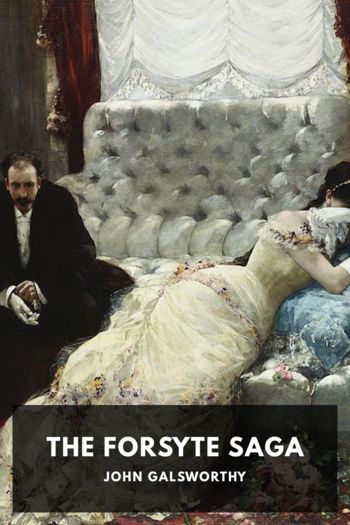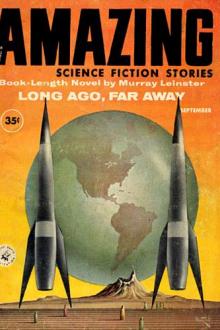The Forsyte Saga - John Galsworthy (best english novels for beginners .txt) 📗

- Author: John Galsworthy
Book online «The Forsyte Saga - John Galsworthy (best english novels for beginners .txt) 📗». Author John Galsworthy
And as he wandered, he thought of him who had finished his wandering, his prowling, and would never haunt his house again.
Already in the afternoon he passed posters announcing the identity of the dead man, and bought the papers to see what they said. He would stop their mouths if he could, and he went into the City, and was closeted with Boulter for a long time.
On his way home, passing the steps of Jobson’s about half past four, he met George Forsyte, who held out an evening paper to Soames, saying:
“Here! Have you seen this about the poor Buccaneer?”
Soames answered stonily: “Yes.”
George stared at him. He had never liked Soames; he now held him responsible for Bosinney’s death. Soames had done for him—done for him by that act of property that had sent the Buccaneer to run amok that fatal afternoon.
“The poor fellow,” he was thinking, “was so cracked with jealousy, so cracked for his vengeance, that he heard nothing of the omnibus in that infernal fog.”
Soames had done for him! And this judgment was in George’s eyes.
“They talk of suicide here,” he said at last. “That cat won’t jump.”
Soames shook his head. “An accident,” he muttered.
Clenching his fist on the paper, George crammed it into his pocket. He could not resist a parting shot.
“H’mm! All flourishing at home? Any little Soameses yet?”
With a face as white as the steps of Jobson’s, and a lip raised as if snarling, Soames brushed past him and was gone. …
On reaching home, and entering the little lighted hall with his latchkey, the first thing that caught his eye was his wife’s gold-mounted umbrella lying on the rug chest. Flinging off his fur coat, he hurried to the drawing-room.
The curtains were drawn for the night, a bright fire of cedar-logs burned in the grate, and by its light he saw Irene sitting in her usual corner on the sofa. He shut the door softly, and went towards her. She did not move, and did not seem to see him.
“So you’ve come back?” he said. “Why are you sitting here in the dark?”
Then he caught sight of her face, so white and motionless that it seemed as though the blood must have stopped flowing in her veins; and her eyes, that looked enormous, like the great, wide, startled brown eyes of an owl.
Huddled in her grey fur against the sofa cushions, she had a strange resemblance to a captive owl, bunched in its soft feathers against the wires of a cage. The supple erectness of her figure was gone, as though she had been broken by cruel exercise; as though there were no longer any reason for being beautiful, and supple, and erect.
“So you’ve come back,” he repeated.
She never looked up, and never spoke, the firelight playing over her motionless figure.
Suddenly she tried to rise, but he prevented her; it was then that he understood.
She had come back like an animal wounded to death, not knowing where to turn, not knowing what she was doing. The sight of her figure, huddled in the fur, was enough.
He knew then for certain that Bosinney had been her lover; knew that she had seen the report of his death—perhaps, like himself, had bought a paper at the draughty corner of a street, and read it.
She had come back then of her own accord, to the cage she had pined to be free of—and taking in all the tremendous significance of this, he longed to cry: “Take your hated body, that I love, out of my house! Take away that pitiful white face, so cruel and soft—before I crush it. Get out of my sight; never let me see you again!”
And, at those unspoken words, he seemed to see her rise and move away, like a woman in a terrible dream, from which she was fighting to awake—rise and go out into the dark and cold, without a thought of him, without so much as the knowledge of his presence.
Then he cried, contradicting what he had not yet spoken, “No; stay there!” And turning away from her, he sat down in his accustomed chair on the other side of the hearth.
They sat in silence.
And Soames thought: “Why is all this? Why should I suffer so? What have I done? It is not my fault!”
Again he looked at her, huddled like a bird that is shot and dying, whose poor breast you see panting as the air is taken from it, whose poor eyes look at you who have shot it, with a slow, soft, unseeing look, taking farewell of all that is good—of the sun, and the air, and its mate.
So they sat, by the firelight, in the silence, one on each side of the hearth.
And the fume of the burning cedar logs, that he loved so well, seemed to grip Soames by the throat till he could bear it no longer. And going out into the hall he flung the door wide, to gulp down the cold air that came in; then without hat or overcoat went out into the Square.
Along the garden rails a half-starved cat came rubbing her way towards him, and Soames thought: “Suffering! when will it cease, my suffering?”
At a front door across the way was a man of his acquaintance named Rutter, scraping his boots, with an air of “I am master here.” And Soames walked on.
From far in the clear air the bells of the church where he and Irene had been married were pealing in “practice” for the advent of Christ, the chimes ringing out above the sound of traffic. He felt a craving for strong drink, to lull him to indifference, or rouse him to fury. If only he could





Comments (0)